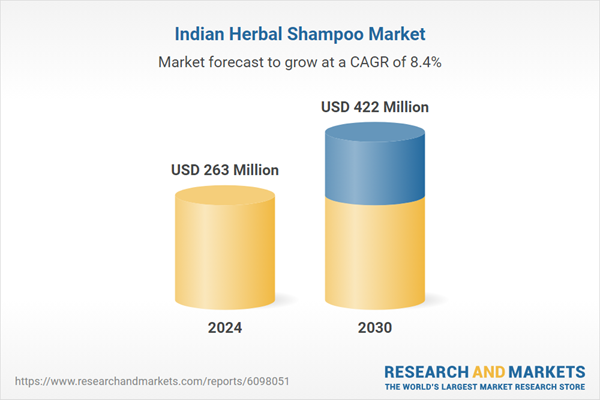In 2021, as part of the Atma Nirbhar Bharat initiative, the Ministry of Finance introduced a ?4,000 crore package to promote herbal cultivation. This scheme is designed to enhance the supply of high-quality raw materials for herbal products, including those used in hair care, by supporting the cultivation and marketing of medicinal plants. Additionally, programs like the AYUSH (Ayurveda, Yoga & Naturopathy, Unani, Siddha, and Homeopathy) Entrepreneurship Development Scheme provide financial assistance, subsidies, and loans to startups and MSMEs in the AYUSH sector, encouraging innovation in herbal hair care solutions.
Consumer trust in the safety and effectiveness of Ayurvedic products is a major factor driving their growing popularity. According to a study published in the International Journal of Creative Research Thoughts, Indian consumers increasingly favor herbal products, viewing them as more effective and free from harmful chemicals. This rising preference for natural, chemical-free alternatives rooted in traditional Indian wellness practices has led companies like Patanjali, Dabur, and Hindustan Unilever (HUL) to increase their investments in the Ayurvedic sector significantly. Patanjali, in particular, has been instrumental in mainstreaming Ayurvedic products by tapping into nationalistic sentiment and promoting the appeal of swadeshi (locally made) goods.
India Herbal Shampoo Market Report Highlights
- Liquid sachets dominate the Indian market due to their affordability and convenience, aligning with consumers' preference for daily or weekly purchases over bulk buying. Priced as low as ?1-?2, they make premium herbal shampoos accessible to a wider audience. For example, Himalaya Wellness offers ?2 sachets of its Dandruff Control Aloe Vera and Hair Fall Control Bhringaraja shampoos to cater to price-sensitive consumers.
- The demand for herbal shampoo bars is fueled by rising environmental awareness and the shift toward zero-waste lifestyles. With minimal packaging, a lower carbon footprint, and a concentrated formula that lasts longer than liquid shampoos, they appeal to eco-conscious and cost-aware consumers. Their travel-friendly, spill-proof design and sulfate-free, natural formulations also make them gentler on sensitive scalps.
- Based on gendar, the men's segment is significantly growing, driven by increasing awareness among male consumers about the benefits of using natural and organic hair care products. As men's grooming and self-care trends continue to rise, more men are investing in premium, nature-based hair care solutions. This growth is further supported by the influence of social media and targeted marketing campaigns that position men's hair care products as essential for achieving healthy, well-groomed, and stylish hair, thereby fueling demand within the segment.
- Based on distribution channel, online sales of herbal shampoos are growing at a faster rate, driven by the convenience of 24/7 access, product variety, and easy price comparisons. Features like subscriptions, influencer marketing, and social commerce boost visibility and repeat purchases. As internet and smartphone access expand in smaller towns, e-commerce becomes the most accessible way to buy niche and premium herbal shampoos.
This report addresses:
- Market intelligence to enable effective decision-making
- Market estimates and forecasts from 2018 to 2030
- Growth opportunities and trend analyses
- Segment and regional revenue forecasts for market assessment
- Competition strategy and market share analysis
- Product innovation listings for you to stay ahead of the curve
Why Should You Buy This Report?
- Comprehensive Market Analysis: Gain detailed insights into the market across major regions and segments.
- Competitive Landscape: Explore the market presence of key players.
- Future Trends: Discover the pivotal trends and drivers shaping the future of the market.
- Actionable Recommendations: Utilize insights to uncover new revenue streams and guide strategic business decisions.
This product will be delivered within 1-3 business days.
Table of Contents
Companies Mentioned
The major companies featured in this India Herbal Shampoo market report include:- The Procter & Gamble Company (Herbal Essences)
- Unilever PLC
- Dabur India Limited
- Cavinkare Private Limited
- Patanjali Ayurved Limited
- Himalaya wellness Company
- Khadi Natural Healthcare (India)
- Biotique Ayurvedics Pvt. Ltd.
- Forest Essentials (A luxasia Company)
- Amway India Private Limited
Table Information
| Report Attribute | Details |
|---|---|
| No. of Pages | 90 |
| Published | May 2025 |
| Forecast Period | 2024 - 2030 |
| Estimated Market Value ( USD | $ 263 Million |
| Forecasted Market Value ( USD | $ 422 Million |
| Compound Annual Growth Rate | 8.4% |
| Regions Covered | India |
| No. of Companies Mentioned | 11 |









